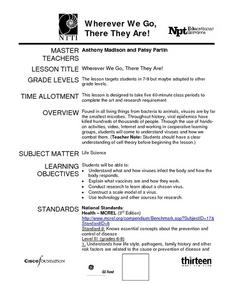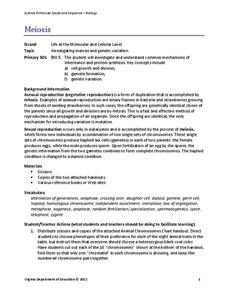Curated OER
Cell Structures and Their Functions
Life science learners investigate live cells. They examine wet mount slides of cyanobacteria and Elodea plants. They peer into the dynamic microscopic world of protists. Afterward, they construct a model of a cell, including rudimentary...
Curated OER
ACTIVITY 6: MAKE A FOSSIL MOLD AND CAST and ACTIVITY 7: HOW BIG WERE PREHISTORIC ANIMALS?
Instructions for two terrific ancient history lessons for your primary paleontologists are provided in this resource. The first involves the creation of fossil cast replicas using plaster of Paris. The directions are detailed, but the...
Curated OER
Watershed Works: Unit 3
Geology whizzes observe the effects of change within a model of a watershed. They place replica waste dumps within the models and note the path that the waste takes as water passes through. This detailed lesson plan provides teacher...
Curated OER
Hydrocarbons
Making models is always memorable. In this activity, physical science starters examine the structure of hydrocarbons using marshmallows, raisins, and toothpicks. They even act as atoms themselves and link arms to represent covalent...
Curated OER
Atomic Structure and Ionic Bonding (A Visual Approach)
Using toothpicks, marshmallows, and round colored sticky dots, physical science enthusiasts build models of an atomic nucleus. In this eighth grade chemistry lesson plan, they play an atom-naming game with the models that they have...
Curated OER
Take a Stab!
Your geology class practices taking core samples of a potato to examine the stratigraphy. This is a terrific modeling lesson that helps youngsters visualize strata that cannot be seen from the surface of the ground. The directions...
Curated OER
Silica Tetrahedron Model
Very simply, pairs of learners construct a model of the tetrahedral silica structure using raisins and toothpicks. They dip it into a soapy solution and then blow a bubble "atom" into its center. The lesson plan gives instructions that...
Curated OER
Layers of Rock
Juvenile geologists drill clear plastic straws down into a playdough sedimentary rock model, pulling out sample rock cores. As they analyze their cores, they apply the law of superposition and discover that originally horizontal layers...
Curated OER
The Battle for Ultimate Power
Students gain an understanding of how the powers of 10 and scientific notation can be used to represent the scale of things in the universe. They relate the number of stars in the universe to the number of grains of sand on Earth's beaches.
Curated OER
Wherever We Go, There They Are!
The central video for this lesson is not available through the included resource link. However, the activity that simulates the passing of a virus through a population is impacting and the other resource links are invaluable. Use this...
Curated OER
Make a Windmill
Students explore Earth science by conducting an energy experiment in class. In this windmill lesson, students identify how wind has been used to pump water throughout history and the latest developments wind energy has produced. Students...
Curated OER
Up and Atom
"Up and Atom" is a mini-unit introducing middle-schoolers to the wonders of elements. Participants draw atom models, examine the periodic table, compare samples of metals to nonmetals, identify unknown elements, and more! The beginning...
Curated OER
Marine Habitats of Galveston Island
Four lessons introduce elementary ecologists to salt marsh and sandy beach habitats. In the first lesson, they place shells and other materials in vinegar to determine if they contain calcium carbonate. In the second lesson, they read a...
Curated OER
Edible Atom/Molecule
Upcoming chemists construct atom or molecule models out of candy. This is a classic idea that learners really enjoy; however, this lesson plan is vague. There is no instruction about the structure of atoms or molecules. Make sure you...
Curated OER
Meiosis
Using yarn and chenille stems, lab groups collaborate to model mitosis and meiosis. Brief background information and a vaguely written procedure comprise this outline. More instruction needs to be provided to learners about cell division...
















